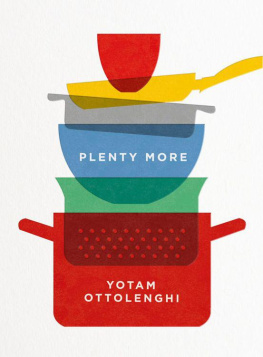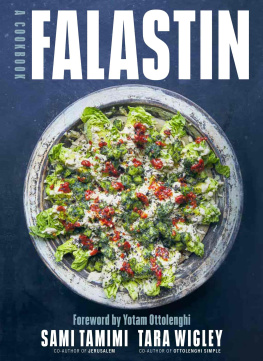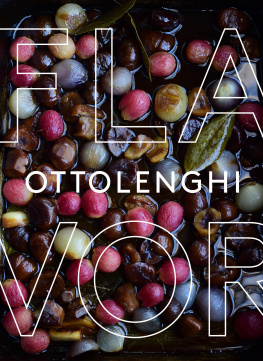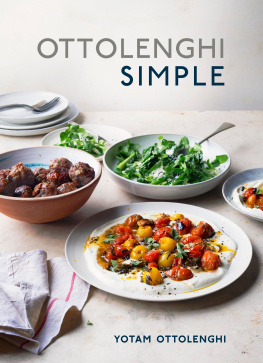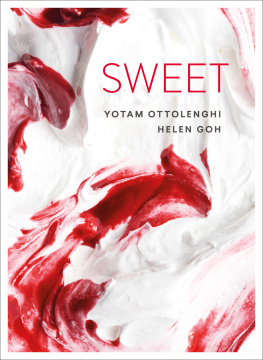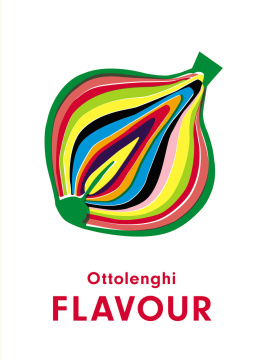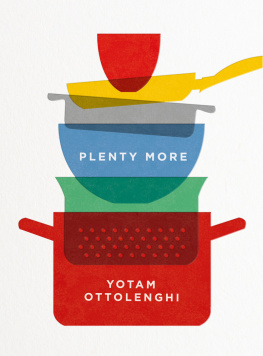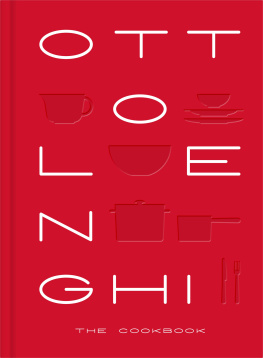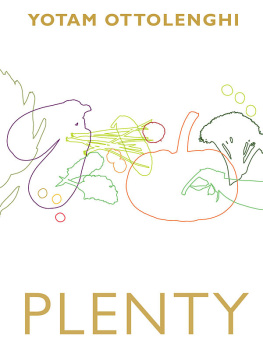CONTENTS
ABOUT THE BOOK
Vegetables have moved from the side dish to the main plate, grains celebrated with colour and flair. Its a revolution that is bold, inspiring and ever-expanding.
Yotam Ottolenghis Plenty changed the way people cook and eat. Its focus on vegetable dishes, with the emphasis on flavour, original spicing and freshness of ingredients, caused a revolution not just in this country, but the world over.
Plenty More picks up where Plenty left off, with 120 more dazzling vegetable-based dishes, this time organised by cooking method. Grilled, baked, simmered, cracked, braised or raw, the range of recipe ideas is stunning. With recipes including Alphonso mango and curried chickpea salad, Membrillo and stilton quiche, Buttermilk-crusted okra, Lentils, radicchio and walnuts with manuka honey, Seaweed, ginger and carrot salad, and even desserts such as Baked rhubarb with sweet labneh and Quince poached in pomegranate juice, this is the cookbook that everyone has been waiting for.
ABOUT THE AUTHOR
Yotam Ottolenghi completed a Masters degree in philosophy and literature whilst working on the news desk of an Israeli daily, before coming to London in 1997. He started as an assistant pastry chef at the Capital and then worked at Kensington Place, Launceston Place, Maison Blanc and Baker and Spice, before starting his own eponymous group of restaurants/food shops, with branches in Notting Hill, Islington and Belgravia. He opened the restaurant NOPI in Piccadilly in 2011. Yotam is the author of the bestselling Ottolenghi: The Cookbook, Plenty and Jerusalem. He has presented two series of Ottolenghis Mediterranean Feast on More 4 and Channel 4. Plenty More is his fourth book.
INTRODUCTION
VEGI-RENAISSANCE
Chunky green olives in olive oil; a heady marinade of soy sauce and chilli; crushed chickpeas with green peas; smoky paprika in a potent dip; quinoa, bulgar and buckwheat wedded in a citrus dressing; tahini and halva ice cream; savoury puddings; fennel braised in verjuice; Vietnamese salads and Lebanese dips; thick yoghurt over smoky aubergine pulp I could go on and on with a list that is intricate, endless and exciting. But I wasnt always aware of this infinite bounty; it took me quite a while to discover it. Let me explain.
As you grow older, I now realise, you stop being scared of some things that used to absolutely terrify you. When I was little, for example, I couldnt stand being left on my own. I found the idea not the experience, as I was never really left alone petrifying. I fiercely resented the notion of spending an evening unaccompanied well into my twenties; I always had a plan. When I finally forced myself to face this demon, I discovered, of course, that not only was my worry unfounded, I could actually feast on my time alone.
Eight years ago, facing the prospect of writing a weekly vegetarian recipe in the Guardian, I found myself gripped by two such paralysing fears.
First, I didnt want to be pigeonholed as someone who only cooks vegetables. At the time, and in some senses still today, vegetables and legumes were not precisely the top choice for most cooks. Meat and fish were the undisputed heroes in lots of homes and restaurant kitchens. They got the star treatment in terms of attention and affection; vegetables had the supporting roles, if any.
Still, I jumped into the water and, fortunately, just as I was growing up and overcoming my fear, the world of food was also growing up. We have moved forward a fair bit since 2006. Overall, more and more confirmed carnivores, chefs included, are happy to celebrate vegetables, grains and legumes. They do so for a variety of reasons related to reducing their meat consumption animal welfare is often quoted, as well as the environment, general sustainability and health. However, I am convinced there is an even bigger incentive, which relates to my second big fear when I took on the Guardian column: running out of ideas.
It was in only the second week of being the newspapers vegetarian columnist that I felt the chill up my spine. I suddenly realised that I had only about four ideas up my sleeve enough for a month and after that, nothing! My inexperience as a recipe writer led me to think that there was a finite number of vegetarian ideas and that it wouldnt be long before Id exhausted them all.
Not at all! As soon as I opened my eyes I began discovering a world of ingredients and techniques, of dishes and skills that ceaselessly informed me and fed me. And I was not the only one. Many people, initially weary of the limiting nature of the subject matter (we are, after all, never asked in a restaurant how wed like our cauliflower cooked: medium or medium-well), had started to discover a whole range of cuisines, dishes and ingredients that make vegetables shine as brightly as any star.
Just like me, other cooks are finding reassurance in the abundance around them that turns the cooking of vegetables into the real deal. They are becoming more familiar with different varieties of chillies, with ways of straining yoghurt, with new kinds of citrus (like pomelo or yuzu), with whole grains and pearled grains, with Japanese condiments and North African spice mixes, with a vast number of dried pasta shapes and with making their own fresh pasta. They are happy to explore markets and specialist shops or go online to find an unusual dried herb or a particular brand of curry powder. They read cookery books and watch television programmes exploring recent cooking trends or complex baking techniques. The world is their oyster, only a vegetarian one, and it is varied and exciting.
TURNING IDEAS INTO RECIPES
I get my recipe inspiration in a variety of ways. When travelling, I am constantly on the lookout for new ideas. A trip to Tunisia is a waste of time unless I come back with the ultimate method for making harissa; Christmas on the beach in Thailand will be cut short (much to my partner Karls dismay) in favour of a search through swarming Bangkok alleys for the elusive best-ever oyster omelette.
My collection of cookery books and magazines takes me on journeys into the creative minds of other cooks, or their heritage, or both. It might start off from an image or an idea that I find in a book combining sorrel with mustard seeds, for example, or roasting carrots with orange halves which sparks a chain reaction leading to a brand new dish. Over the past few years I have been on a long journey to Iran alas, a virtual one through the pages of some of my favourite books (may I mention Najmieh Batmanglijs marvellous Food of Life?); I have been on similar tours to Lebanon and Japan (Michael Booths Sushi and Beyond is exemplary); and I was made privy to the ins-and-outs of various unusual grains (through Liana Krissoffs Whole Grains for a New Generation) and vegetables (by Deborah Madisons Vegetable Literacy).
My colleague chefs at Ottolenghi and NOPI Sami, Scully, Helen and many others also constantly stimulate me with their ideas, which turn into dishes and products that we serve in our shops and restaurants.

